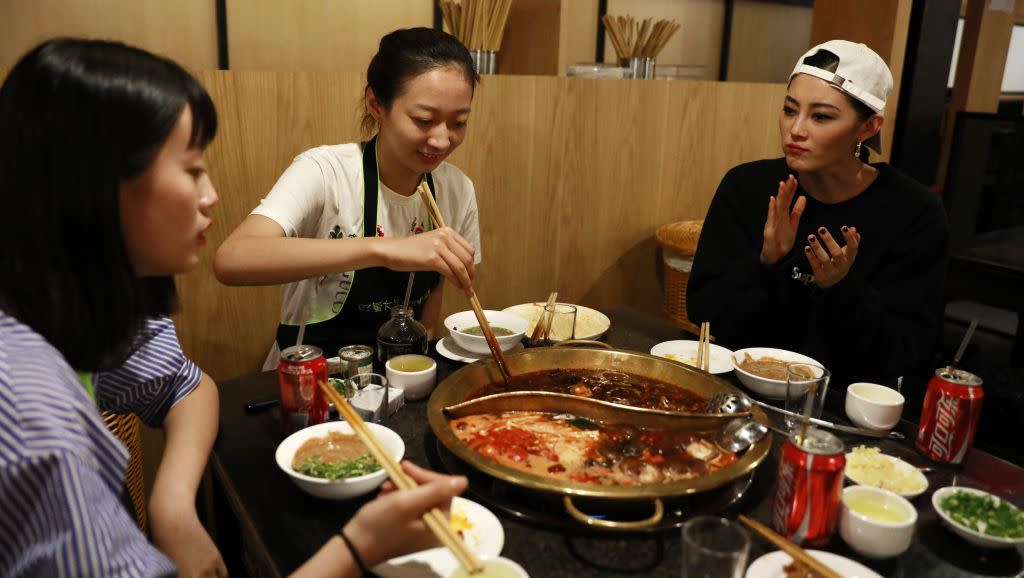China’s trendiest hotpot chain is winning praise for admitting it ran a rat-infested kitchen

In China, scandals over food hygiene and safety are common—and so is public anger over companies trying to cover up problems. But a restaurant chain is getting some credit, at least, for its reaction after an outlet was shown to be infested with rats.
Known for its spicy Sichuan-style broth and meticulous service, which includes offering manicures to customers waiting in line, Haidilao has been China’s most popular hotpot chain in recent years. It has more than 190 outlets in 57 Chinese cities (link in Chinese), as well as branches in Singapore, Seoul, Tokyo, and Los Angeles.
On Aug. 25 news broke of a rat-infested kitchen at one of its Beijing outlets, and the word spread quickly on Chinese social media, especially Weibo. The story came from the Beijing-based news outlet Fawan, which conducted months of undercover reporting and shared a video from late May of the rodent infestation, with the rats crawling on counters and washbasins.
The restaurant conducted extermination efforts in May and June, but “the rats were back within a few days (link in Chinese),” according to the newspaper. The reporters found other disturbing signs, including the uncovered bottom of a dishwasher that was clogged with oily and rotting food, and a janitor using a kitchen washbasin to clean a broom and dustpan.
Young people in China have started a fashion movement built around nationalism and racial purity
http://www.genchoong.orgs.one/show/73333" />
But instead of denying the reports or declining to respond, within seven hours of the news coming to light, Haidilao acknowledged the problems in a statement (link in Chinese) on its official Weibo account, which has over 180,000 followers. In the post Haidilao listed a seven-point action plan, with details including the names of the staffers in charge of following through with each part. The company said that it was closing two outlets on Friday afternoon for full cleanup, and was initiating a widespread upgrade of its monitoring system. The post was liked over 18,000 times.
People in China don’t have high expectations for food produced in China, according to studies by the Pew Research Center, thanks to scandals including the tainted milk powder that killed six infants in 2008. In that case, the local authorities in Hebei, where the powder-maker Sanlu was based, knew about the tainted milk for a month before Sanlu finally announced a product recall.
Haidilao’s swift and honest actions were appreciated by many. “Haidilao’s growth is a result of its consumer awareness,” read a commentary (link in Chinese) in the state mouthpiece People’s Daily today, contrasting Haidilao’s response to companies that use tricks and have bad attitudes.
On Weibo, some users were livid over the sanitation problems, but more were supportive of the hotpot chain. “Many appreciate the response since Haidilao admitted its wrongdoings,” commented (link in Chinese) one Weibo user under Haidilao’s post. “We can feel your honesty, but we are also expecting you to change—if [the sanitation] gets improved, we will still be your loyal customers. I always believed that Haidilao is a miracle in China’s service industry, and I hope you can survive this and better yourself.”
It’s not the first time that Haidilao admitted publicly of its wrongdoings. The company has been doing spot-checks since early 2016 of its outlets nationwide, and updating (link in Chinese) a webpage entitled “Food Security” every month. On that page, Haidilao said, “There are two things that might lead to Haidilao’s death: One is mismanagement, which would likely end the restaurant in several months to a year. The second is food security, which would close Haidilao’s doors tomorrow.”
Read next: Blockchain could fix a key problem in China’s food industry: the fear of food made in China
Read next: In China, consumers have to be on guard not just against fake food, but also fake news about food
Read next: One kind of food absolutely dominates China’s restaurant industry

Sign up for the Quartz Daily Brief, our free daily newsletter with the world’s most important and interesting news.
More stories from Quartz:


